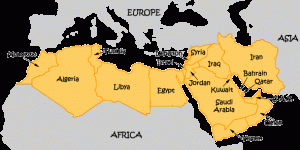Middle East and North Africa (MENA) region spending on oil investment is forecast to increase 11 percent in 2012, industry analysts said, with the number of oil rigs expected to grow 14 percent as "a tremendous amount of exploration and development activity" in the region needs to go ahead.
The just published "Oil & Gas: Exploration & Production Report" quoted J. David Anderson, a senior analyst covering oilfield services and equipment who recently joined J.P. Morgan as an executive director, as saying that "we see about an 11 percent increase to spending in 2012, but I think most of the risk is probably to the downside. We are looking at three regions, in particular, to see the spending increase. First off, onshore North Africa - obviously, with Libya and Egypt having some political issues over the last year - we are just starting to see that come through. Algeria has been a country which has been plagued by a lot of political issues as well. So there are a number of political issues that need to be resolved to start seeing that pick up in the North African land. Offshore West Africa is another big area that can really turn the tide on the international market. In Nigeria and Angola, in particular, there is a tremendous amount of exploration and development activity that needs to go ahead."
He added that "some positive signs out of East Africa as well with Anadarko (APC) making a number of recent discoveries. So we see a huge amount of promise on the offshore market for West Africa. But the big key for it all will really be Middle East land. Within our forecast of 11 percent spending, we are including a 14 percent increase in the Middle East rig count. Saudi Arabia is always the biggest player there."
James West of Barclays Capital added that "oil prices are very constructive for spending, the economics of most projects around the world are very good, and so companies are going to and want to invest in major and key projects. And I think the companies have some pent-up demand as well because of the lack of spending or the slower spending level that we saw in late 2008, 2009, and the slow ramping up of the business throughout 2010 and 2011."
He added that the worldwide offshore rig count today is now at an all time high, the working rig count at an all time high, so higher than the levels in 2008, so it shouldn’t be surprising that capital spending as we see it is approaching some $600 billion in 2012, which will be, as you know, a record year."
Brent oil prices hit an eight-month high Friday, driven by simmering geopolitical tensions over key crude producer Iran and optimism the Greek debt crisis can be resolved, traders said.
Brent North Sea crude for April delivery hit $120.70 per barrel, its highest point since June 14. It later pulled back to $119.84, down 27 cents from Thursday’s closing level.
New York’s main contract, West Texas Intermediate (WTI) light sweet crude for delivery in March, rose 41 cents to $102.72.
"Greater risk appetite in the light of hopes of financial assistance for Greece, coupled with the Iran crisis, have caused Brent to climb to an eight-month high of over $120," said Commerzbank analyst Carsten Fritsch.
"Admittedly, Iran has denied reports of an immediate ban on oil shipments to the EU, yet consumers in Europe already appear to be preparing themselves for just such an eventuality," Fritsch said.
"According to industry sources, the leading European oil companies have slashed their March oil imports from Iran by more than 300,000 barrels per day. This is prompting additional demand for alternative oil types and is thus causing prices to rise."
The market also gained ground on continued tension between Western powers and Iran, as well as positive economic data from the United States, analysts said.
(Source: Saudi Gazette)





